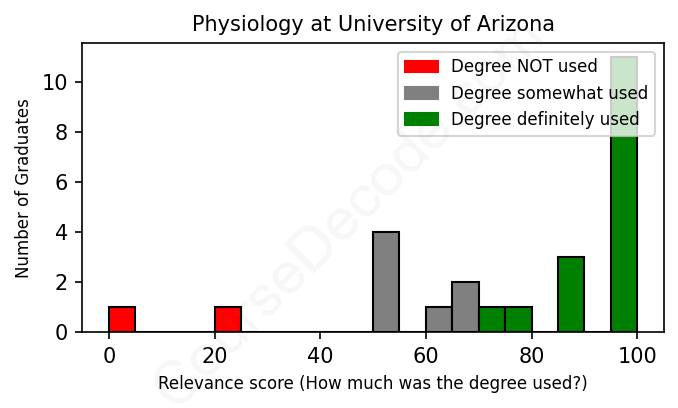
First, some facts. Of the Physiology graduates from University of Arizona we've analyzed , here's how many have used (or NOT used) their degree in their career:

These are estimates based on AI analysis of 25 LinkedIn profiles (see below).
The verdict? Above average. Overall, with an average relevance score of 77%, Physiology graduates from University of Arizona have a higher likelihood (+10%) of finding work in this field compared to the average graduate across all fields:
And for comparison, here's the chart for all profiles we've looked at across all degrees.
Also, after graduating, 48% of these graduates have pursued further education other than another Bachelor's degree (such as a Masters degree or other), compared to the average across all profiles of 35%. This suggests you may need more than just a Bachelors degree to be competitive as a Physiology graduate.
See the details:
|
Relevance score: 100% We think this person has gone into a career highly relevant to their degree. We think this person has gone into a career highly relevant to their degree.
DEGREE INFOGraduated in 2021 from University of Arizona with a Bachelor's degree in Physiology. Also pursued further education since (see below). JOB HISTORY SINCE GRADUATIONOccupational Therapy Technician Spooner Physical Therapy Aug 2021 - Jul 2023 FURTHER DEGREES DONE SINCE GRADUATINGDoctorate of Occupational TherapyNorthern Arizona University 2023 - 2026 ABOUTNo information provided. |
The top 10 most common jobs done by the graduates we've analyzed (ranked most common to least) are:
After looking into the career paths of individuals with a degree in Physiology from the University of Arizona, it seems like there are two main types of jobs that stand out. A lot of graduates end up working in fields directly related to healthcare, such as physical therapy or research roles. For instance, many have taken positions as Physical Therapists, Perfusionists, or Research Assistants in public health, where their knowledge of human anatomy and physiology comes into play every day. These roles make good use of the skills they developed during their studies, allowing them to apply what they learned in the real world.
On the flip side, there are also quite a few graduates who step into jobs that aren't entirely aligned with their physiology background, like administrative roles or hospitality positions. While these jobs might utilize some of the soft skills gained during their education, they don't really tap into that specialized physiological knowledge. Overall, it seems that while many graduates do find relevant positions in healthcare and research, others branch out into areas that don’t directly relate to physiology, which can dilute the strong foundational training they received in their degree. It's a mixed bag, but there’s definitely a notable presence in health and research fields.
Here is a visual representation of the most common words in job titles for Physiology graduates (this is across all Physiology graduates we've analyzed, not just those who went to University of Arizona):

Graduates from the University of Arizona with a degree in Physiology seem to have a variety of career paths, but many tend to gravitate towards roles in healthcare and research right after graduation. For instance, many individuals who graduated in the earlier years took up positions like physical therapists, medical scribes, or research assistants, which seem to align well with their educational background. This initial career choice is not surprising, given that Physiology provides a strong foundation for understanding the human body and its functions, making those early jobs a solid fit for graduates.
As time goes by—say, around 5 to 10 years after graduation—the trends appear to solidify even further. Many alumni have moved into advanced positions in health-related fields, such as becoming licensed physical therapists, perfusionists, or even furthering their education to become resident physicians or clinical coordinators. Others have ventured into roles that still utilize their background in research, like becoming assistant professors or taking up significant positions at research institutes. However, there are also those who have transitioned into more corporate roles, such as in management or product development in companies like American Express. Overall, while a number of graduates have certainly found success and relevance in their careers, a few have strayed into areas that are less connected to their Physiology degree. It seems the degree gives them a solid grounding, but individual paths can vary widely based on personal interests and opportunities that arise after college.
Hey there! So, when it comes to a Bachelor’s degree in Physiology, it can be a bit challenging but totally doable. At the University of Arizona, you'll be diving into some pretty complex topics about how the body works, and there will be a fair amount of science courses like biology and chemistry that can get pretty tricky. It’s definitely not a walk in the park, but if you’re passionate about the subject and willing to put in the effort, it’s definitely manageable. In general, degrees in the sciences tend to be on the harder side compared to some other majors, but if you stay organized and make use of resources like tutoring and study groups, you should be totally fine!
Most commonly, in the LinkedIn profiles we've looked at, it takes people 4 years to finish a Bachelor degree in Physiology.
Looking at the career paths of these University of Arizona Physiology graduates, it seems like most of them have done pretty well financially, especially those who landed roles in healthcare, research, or management early on. For instance, the person who moved from being a research assistant to an assistant professor at Johns Hopkins is likely making a solid salary now, as academic positions can pay quite well. Similarly, the graduates working in physical therapy or as perfusionists typically earn decent salaries, especially as they gain experience. However, some of the earlier positions like administrative roles or internships are likely lower-paying, but they seem to be stepping stones to more profitable jobs. Overall, while not everyone might be raking in top dollar right away, many of these folks are on paths where they can earn a comfortable living over time.
Here is a visual representation of the most common words seen in the "about" section of LinkedIn profiles who have a Bachelor degree in Physiology (this is across all Physiology graduates we've analyzed, not just those who went to University of Arizona). This may or may not be useful:

Here are all colleges offering a Bachelor degree in Physiology (ordered by the average relevance score of their Physiology graduates, best to worst) where we have analyzed at least 10 of their graduates:
| College | Score | Count |
|---|---|---|
 University of Arizona University of Arizona
|
77 | 25 |
 University of California, Los Angeles University of California, Los Angeles
|
76 | 14 |